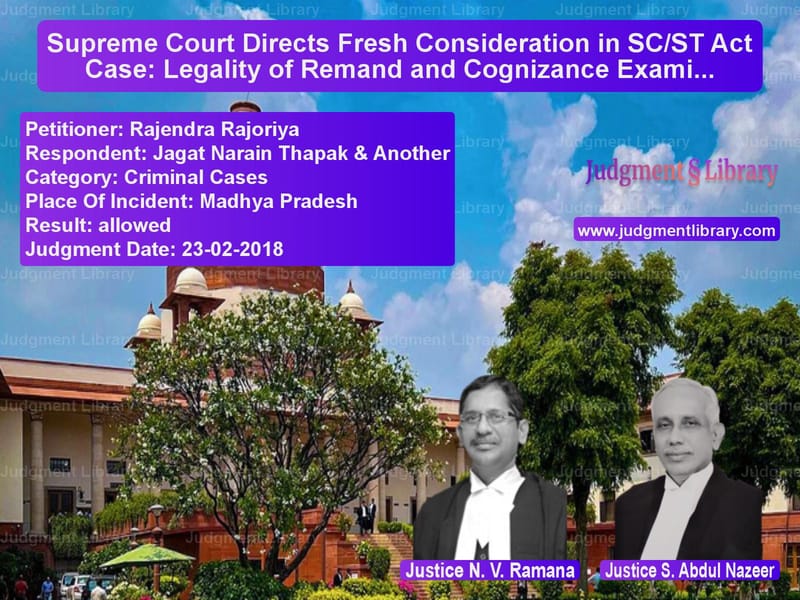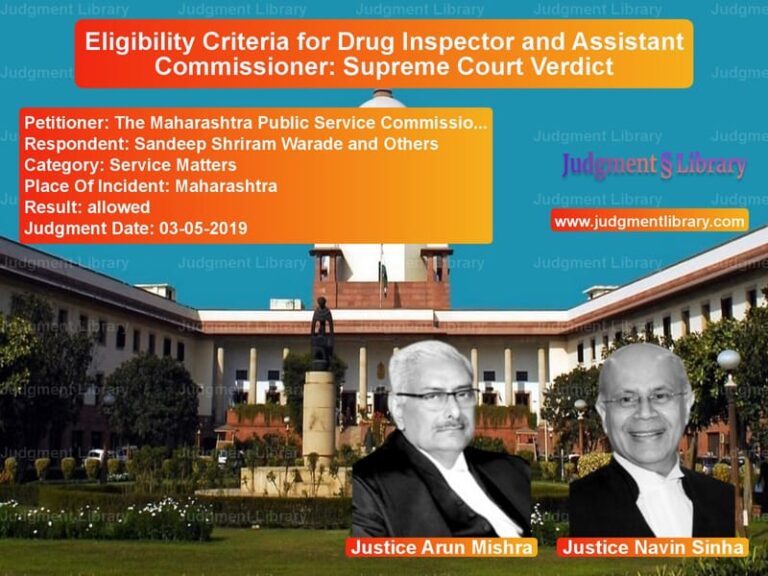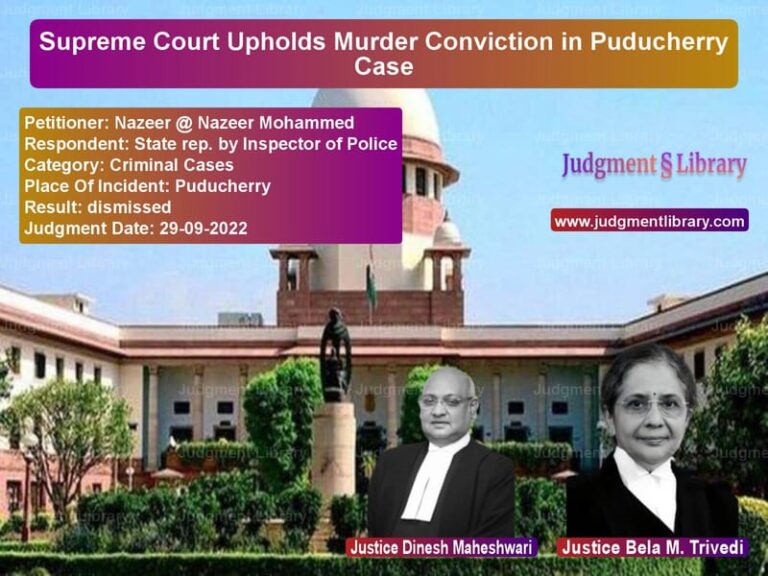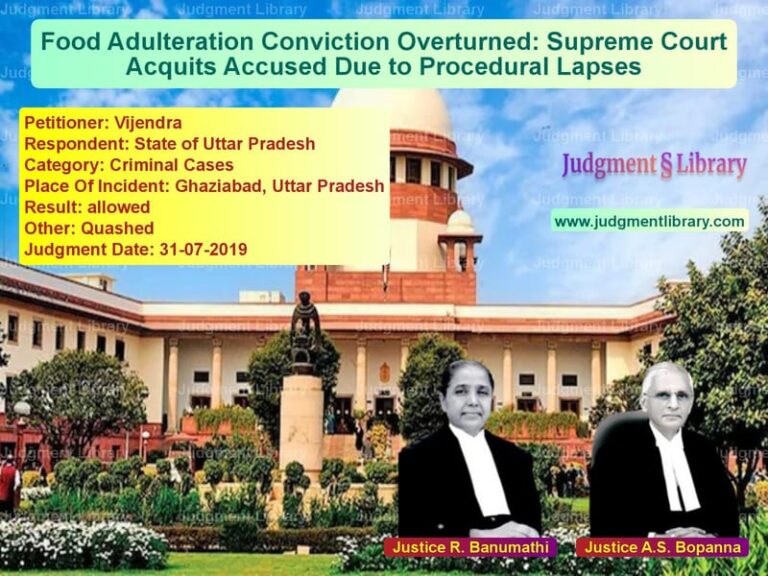Supreme Court Directs Fresh Consideration in SC/ST Act Case: Legality of Remand and Cognizance Examined
The Supreme Court of India recently ruled in the case of Rajendra Rajoriya vs. Jagat Narain Thapak & Another, addressing significant issues related to criminal revision, the exercise of judicial discretion, and the procedural correctness of taking cognizance under the Scheduled Castes and Scheduled Tribes (Prevention of Atrocities) Act, 1989, and the Indian Penal Code (IPC). The Court set aside the High Court’s order and directed the trial court to reconsider the matter afresh.
The case revolved around allegations of fraud, forgery, and caste-based threats, leading to a complaint under IPC sections 420, 467, 468, 471, 120B, 506, and Section 3 of the SC/ST Act. The matter escalated due to conflicting decisions by the Magistrate, Sessions Court, and the High Court, prompting the Supreme Court to examine the legality of the remand order and subsequent cognizance.
Background of the Case
The appellant, Rajendra Rajoriya, filed a police complaint alleging that the respondents had fraudulently sold his land, committed forgery, and made caste-based derogatory remarks while threatening him. The police took no action, leading the appellant to approach the Magistrate under Section 200 of the Criminal Procedure Code (CrPC).
The Judicial Magistrate, Gwalior, dismissed the complaint on April 21, 2012, citing insufficient proof that the appellant belonged to a Scheduled Caste and ruling that the dispute was of a civil nature.
Appeal Before the Sessions Court
Rajoriya challenged the dismissal in the Sessions Court through Criminal Revision No. 242/2012. The Sessions Court, in an order dated December 7, 2012, ruled that the appellant belonged to the Jatav community, a Scheduled Caste, and that the allegations indicated fraudulent transfer of land. It concluded that the Magistrate had not properly appreciated the facts and remanded the case for reconsideration, stating:
“This revision is allowed and order dated 21.04.2012 passed by the Court is set aside. The case is remanded back with a direction that after further inquiry, keeping in view the findings in this order, a proper order be passed regarding registration of complaint and summoning of respondents.”
Magistrate’s Cognizance Post-Remand
On January 23, 2013, the Magistrate took cognizance under IPC Sections 420, 467, 471, 120B, and Section 3(1)(4) of the SC/ST Act. While doing so, the Magistrate noted:
“The revisional court has prima facie already found sufficient ground for initiating proceedings.”
Challenge Before the High Court
The respondents challenged the remand order and the cognizance order in Criminal Revision No. 104/2013 before the Madhya Pradesh High Court. The High Court, on July 8, 2014, quashed the complaint, stating:
“The Sessions Court has no power to take cognizance, assess the offense, and direct registration of a complaint. The Magistrate’s order was in violation of Section 398 CrPC.”
Supreme Court’s Review and Judgment
The Supreme Court examined two key issues:
- The legality of the remand order by the Sessions Court.
- The validity of the Magistrate’s cognizance order.
Legality of the Remand Order
The Court observed that under Sections 397 and 398 CrPC, the Sessions Judge has the power to examine correctness, legality, and propriety of orders passed by subordinate courts. It noted:
“The revisional court only provided reasons for ordering further inquiry. The observations on merit did not amount to taking cognizance.”
The Court found the High Court’s interpretation erroneous and held that the remand was legally justified.
Validity of the Magistrate’s Cognizance Order
While upholding the legality of the remand, the Supreme Court criticized the Magistrate’s approach. It stated:
“The Magistrate must apply independent mind while taking cognizance. Merely relying on the Sessions Court’s observations does not fulfill the requirement of judicial discretion.”
Key Takeaways from the Judgment
- Revisional Power Under Section 397/398 CrPC: The ruling clarified that Sessions Courts can remand cases for further inquiry but cannot assume jurisdiction of a trial court.
- Magistrate’s Duty to Apply Independent Mind: Taking cognizance should be based on an independent assessment rather than mere reliance on superior court observations.
- High Court’s Overreach: The Supreme Court held that the High Court erred in interpreting the Sessions Court’s order as illegal cognizance.
- SC/ST Act Considerations: The Court refrained from commenting on the merits of caste-based allegations, emphasizing procedural propriety.
Conclusion
The Supreme Court’s decision in Rajendra Rajoriya vs. Jagat Narain Thapak is a crucial precedent for criminal revision cases, affirming the revisional court’s power to order inquiries while emphasizing the need for Magistrates to exercise independent judicial discretion. By setting aside the High Court’s order and directing a fresh consideration of the case, the judgment ensures procedural fairness while upholding the due process of law.
Petitioner Name: Rajendra RajoriyaRespondent Name: Jagat Narain Thapak & AnotherJudgment By: Justice N. V. Ramana, Justice S. Abdul NazeerJudgment Date: 23-02-2018
Don’t miss out on the full details! Download the complete judgment in PDF format below and gain valuable insights instantly!
Download Judgment: Rajendra Rajoriya vs Jagat Narain Thapak Supreme Court of India Judgment Dated 23-02-2018.pdf
Direct Downlaod Judgment: Direct downlaod this Judgment
See all petitions in SC/ST Act Case
See all petitions in Fraud and Forgery
See all petitions in Judgment by N.V. Ramana
See all petitions in Judgment by S. Abdul Nazeer
See all petitions in allowed
See all petitions in supreme court of India judgments February 2018
See all petitions in 2018 judgments
See all posts in Criminal Cases Category
See all allowed petitions in Criminal Cases Category
See all Dismissed petitions in Criminal Cases Category
See all partially allowed petitions in Criminal Cases Category







